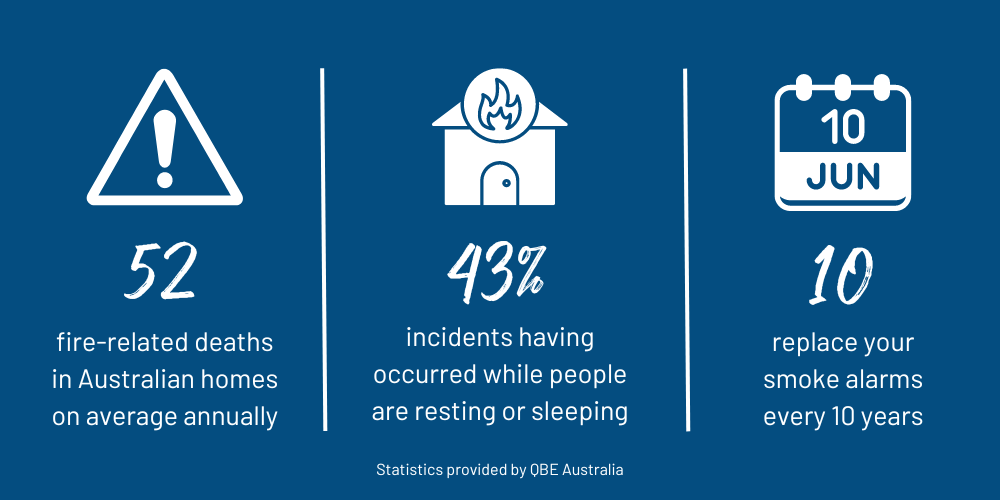As we approach the cooler months, we instinctively turn on the heater, plug in the electric blanket, and find convenient ways to keep warm and cozy. However, the alarming rates of catastrophes caused by faulty electrical goods or improper heating during Winter is a cause for concern. The
Fire & Rescue New South Wales (FRNSW) calls for every household or business owner to upgrade or install smoke alarms.
Smoke alarms are critical devices that can save lives, protect property, and provide early warning in the event of a fire emergency. It is essential to prioritise the installation of smoke detectors in both residential and commercial spaces.
In this broker’s blog post, we discuss the significance of smoke alarms in every home and business, following the FRNSW guidelines.
Early Detection and Alertness by Smoke Alarms
The primary purpose of smoke detectors is to detect the presence of smoke in its early stages. This is often before flames are visible or the fire has fully developed. By promptly sensing smoke, these devices can raise the alarm and provide early warning to occupants. By quickly alerting the occupants, allows them to evacuate the premises safely and quickly. According to FRNSW, having a working smoke alarm installed significantly increases the chances of surviving a residential fire.
Fire Prevention and Property Protection
Smoke alarms not only save lives but also play a crucial role in preventing extensive property damage caused by fires. By detecting smoke early, the alarms can help initiate prompt action. This includes calling emergency services and extinguishing the fire in its early stages. FRNSW emphasises that a well-maintained smoke alarm can provide valuable time for occupants to suppress small fires or escape from larger ones, potentially minimising property loss.
Compliance with Regulatory Standards
Fire and Rescue New South Wales (FRNSW) provides regulatory guidelines and requirements for installing and maintaining smoke detectors. These guides are for both residential and commercial settings. Following these guidelines ensures that your home or business complies with safety standards. Compliance enhances the safety of occupants, demonstrates responsible property ownership, and reduces liability.
Legal Obligations and Insurance Requirements
In many jurisdictions, including New South Wales, there are legal obligations regarding the installation and maintenance of smoke alarms. Failure to comply with these requirements may lead to legal consequences and potential liability in case of fire-related incidents. Furthermore, insurance providers often stipulate the presence of working smoke alarms as a prerequisite for coverage. This emphasises the significance of these devices in mitigating risk and ensuring insurance claims are valid.
Cyber Liability Insurance is designed to help protect you from claims and support your profitability in the event of a cyber breach or attack.
Public Liability insurance is there to provide protection if someone makes a claim against the insured, the business or its employees.
A business insurance pack can provide cover for your business premises and contents, against loss, damage, theft or financial loss from an insured interruption to the business.
In many jurisdictions, including New South Wales, there are legal obligations regarding the installation and maintenance of smoke alarms. Failure to comply with these requirements may lead to legal consequences and potential liability in case of fire-related incidents. Furthermore, insurance providers often stipulate the presence of working smoke alarms as a prerequisite for coverage. This emphasises the significance of these devices in mitigating risk and ensuring insurance claims are valid.
Types of Smoke Alarms and Maintenance
There are two primary types of smoke detectors: ionisation and photoelectric. Ionisation alarms are more responsive to flaming fires, while photoelectric alarms are better at detecting smouldering fires. For optimal protection, it is recommended to have a combination of both types or dual-sensor alarms.
Regular maintenance is crucial to ensure the effectiveness of smoke alarms. Testing the alarms monthly, replacing batteries annually (if applicable), and replacing the entire unit every ten years (as recommended by FRNSW) are essential steps to guarantee their proper functioning.
Conclusion
Installing smoke alarms in every home and business is a small yet significant step towards ensuring the safety and well-being of occupants and protecting valuable property. By adhering to the guidelines and regulations provided by Fire and Rescue New South Wales (FRNSW), we can create a safer environment and reduce the devastating consequences of
fires. Remember, the early detection and warning provided by smoke alarms can make a crucial difference in preventing loss of life and property, underscoring the importance of these vital safety devices.






